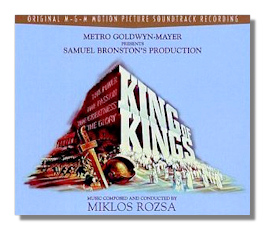
The Internet's Premier Classical Music Source
Related Links
- Rózsa Reviews
- Latest Reviews
- More Reviews
-
By Composer
-
Collections
DVD & Blu-ray
Books
Concert Reviews
Articles/Interviews
Software
Audio
Search Amazon
Recommended Links
Site News
 CD Review
CD Review
Summary for the Busy Executive: Sour cream, and lots of it.
Every so often, Hollywood – the Whore of California – decides God is box office. The Fifties and Sixties saw a rush of quasi-religious pictures, from Quo Vadis to DeMille's remake of his silent Ten Commandments, The Silver Chalice, The Miracle, The Greatest Story Ever Told, Ben-Hur, The Bible, King of Kings, and The Fall of the Roman Empire. Many made enough money to spawn a side industry of non-Biblical spectaculars like Spartacus, El Cid, and 55 Days at Peking. So many of these movies cross over into pure camp or suffer from the Creeping Jesuses. A few, while failing to do justice to their subjects, at least have some sort of interest beyond the Technicolor and rise above a tent-show mentality. I still recall my parents taking me to The Ten Commandments (1956) and the thrill I felt when I saw the Red Sea part. On the other hand, I remember an entire theater laughing, groaning, and making nasty comments out loud during a screening of The Fall of the Roman Empire (1964). Apparently, the movie annoyed the general public just as much as it did me. It ruined the producer, Samuel Bronston (Lenin's nephew, no kidding), who just a few years earlier had been riding high on El Cid's horse. The trend died out, and the epics became simply too expensive to make. Movie audiences left the Bible for Ian Fleming's St. George.
King of Kings was fortunate in its writer, Philip Yordan, and its director, Nicholas Ray, as well as in much of its cast, including Robert Ryan, Harry Guardino, Frank Thring, Hurd Hatfield, and Rip Torn. At least it's not awful. Ray, beloved of the Cahiers du Cinema crowd and director of terrific movies like They Live by Night, Knock on Any Door, In a Lonely Place, Rebel Without a Cause, and Johnny Guitar, had an eccentric sensibility and an up-and-down film career. King of Kings represented a comeback, since the movie did well enough. Unfortunately, the eccentricity that makes Ray interesting isn't on show here, although his filmmaking technique – the crowd scenes especially – never deserts him. If not exactly Scorsese, at least you can still watch this movie, one of the more intelligent specimens of the genre.
The film gets a lot of help from Miklós Rózsa's score. Rózsa set the musical agenda for epics of this period, having also worked on Quo Vadis and Ben-Hur. For me, he went to the well just once too often. The score, fine in itself, is noticeably less than either of the earlier ones – more professional than inspired – but it's still Rózsa, better than all but a handful. Rózsa occasionally goes over the top, as he did in Quo Vadis, but that excess belongs to the genre. It's a rich, yummy score. If you're looking for something to stimulate your mind, look elsewhere – the Bach Goldbergs, maybe. If you want full-blown aural sex, however, you can pay for it here. As in most of his films, Rózsa uses tags, rather than (as sometimes claimed) Leitmotiven. For example, there's a King of Kings "theme" that the orchestra plays basically whenever Jeffrey Hunter (as Jesus) appears, but the tags are simply redundant musical illustrations or reinforcements of what's happening at that moment on-screen, rather than dramatic commentary.
The notes consist of mainly the original essays of the soundtrack album. MGM made the picture a Big Deal, exhibiting the movie in two parts with an "entr'acte," presumably so the audience could spring for more popcorn. The studio also issued the soundtrack album as a deluxe boxed set, with unintentionally hilarious liner notes. For example:
Youngest Salome in history, 16-year-old Brigid Bazlen was the star of Chicago's television program for children, "The Blue Fairy" …. Following her KING OF KINGS role, Brigid was signed to an M-G-M contract and co-starred in "The Honeymoon Machine."
One also finds the usual self-aggrandizing ballyhoo about various production staff. Fortunately, Rózsa and Ray survive their blurbs. They probably cringed if they read them.
The sound is problematic. Rhino has done its best to clean things up, but those who expect the latest digital sonic fantasy will be disappointed. The sonic picture is a bit constricted, and distortion still clings to climaxes. However, this is the most complete recording of the King of Kings – no niggling little excerpts – including some sequences left out of the original LP release. Recommended for all Rózsa headbangers, among whom I find myself.
Copyright © 2009, Steve Schwartz



















